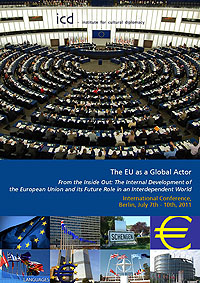The EU as a Global Actor
From the Inside Out: The Internal Development of the European Union and its Future Role in an Interdependent World

Conference Agenda
“Europe as a Global Actor” will focus in particular on the following issues:The European Project: Enlargement, Integration, and Reform
Though its origins date back almost six decades, the modern form of the European Union began to take shape after the fall of the Berlin Wall, an event that profoundly shook the global political system and paved the way for a larger, more integrated alliance. Although the European Union is more and more accepted as a necessary project, many issues force the members to rethink the nature, targets and future of the institution. The integrated alliance is challenged by the economic crisis, refugees from Northern Africa and the difficulty to shape a common foreign policy. The very nature of the European Union ensures that all significant changes must meet with the approval of all member states. This requirement may prove to be either its savior or its downfall, as the EU continues to grow.- The Expansion of the European Union: Where, and When?
(Focus: Turkey, the Balkans, Northern Africa, EU principles) - The Future of European Integration and Migration
(Focus: Schengen, policy making, legal issues, EU budget, culture, the Lisbon Treaty) - Democratic Deficit: Myth or Reality?
(Focus: The European Parliament, The European Commission, EU elections, National Governments and the EU) - The Euro and the Eurozone: Stability or Fragility?
(Focus: Greece, Portugal, Germany, Euro-bonds, the IMF, Ireland) - The Future of Europe’s Economies
(Focus: The service industry, information technology, manufacturing, economic interdependence) - The Challenges Ahead for Europe and the European Union
(Focus: Religious extremism, far-right political parties, EU policy making, immigration) - The European Public Sphere: is Europeanization taking place?
(Focus: communication, media’s role in building “the European identity”, national vs. EU interest, role of Russia)
Europe’s Role as an International Political Player
The enactment into force of the Lisbon treaty in December 2009 gave the European Union, in theoretical terms, a stronger platform on which to base a common foreign policy. The region has long had a profound influence in international relations on account of its strong economies, historical ties to other parts of the world and, more recently, the normative power of the EU. Of fundamental importance to the future role of Europe in global politics is therefore how it balances traditional interests, and influence, with the need to apply a common foreign policy that places global public goods above national interests.- The Foreign Policy Innovations of the Lisbon Treaty
(Focus: EU decision-making, the External Action Service, the High Representative) - Europe’s Approach to Political Instability in Northern Africa and the Middle East
(Focus: The EU and NATO, political relations, humanitarian aid, democracy promotion) - The Challenges and Opportunities Ahead for the Transatlantic Relationship
(Focus: NATO, Afghanistan and Central Asia, climate change, military intervention, UN reform) - Europe’s Responsibility in Preventing and Responding to Climate Change
(Focus: Carbon offsetting, renewable energy, international regulation, pollution control) - Europe as Global Peacekeeper
(Focus: Aid, peacekeeping, humanitarian intervention, the Capability of
NATO and the UN) - Strengthening the Global Economy and Supporting Developing Countries
(Focus: Free trade areas, the World Bank and the IMF, aid vs. trade, international investment)
The Influence of Culture on Europe’s Foreign Policy and the Development of the EU
Whilst Cultural Diplomacy was practiced widely by the US and the Soviet Union during the Cold War, and has a tradition in Europe that stretches back to the 19th century, the process of globalization and the importance of global public goods has placed a greater emphasis than ever on international relations based on dialogue, understanding, and trust. The emerging concept of national brands closely linked to the practice of cultural diplomacy and the application of soft power, offers both political and economic benefits to states and regions, but is both a complex and changing field.- Culture and European Integration
(Focus: European cultural capitals, immigration and integration, Islam in Europe, European history) - The Application of Cultural Diplomacy in EU Foreign Policy
(Focus: The External Action Service, national cultural institutions, academic exchange, innovation in cultural exchange) - The Role of Soft and Normative Power in European Foreign Policy
(Focus: Hard, smart, and soft power; national branding; human rights; democracy promotion) - Nation Branding and the Benefits of a Positive International Image
(Focus: History and development of nation branding, tourism, investment, soft power)






























































